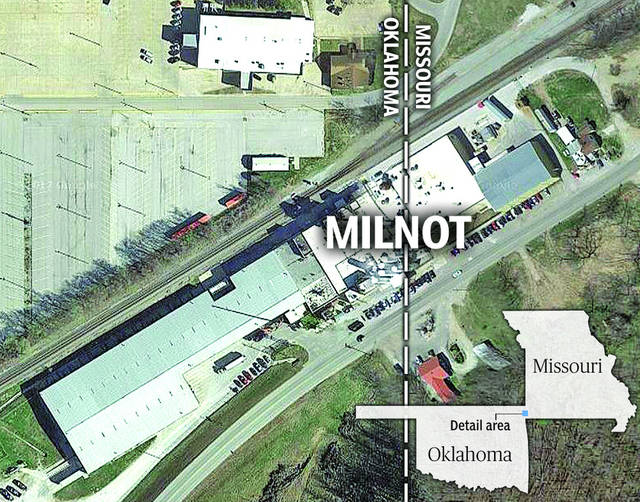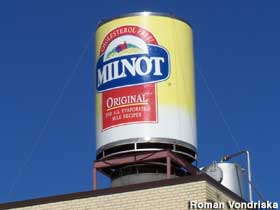Every year when I teach the story of United States v. Carolene Products, I show my students the ingenuity of Charles Hauser. He built a factory on the Oklahoma-Missouri border. Why? To service both states, without engaging in interstate commerce.
The factory actually had a brass rail going straight across the state line. All equipment and products were maintained separately on each side of the factory. The most important step–the addition of vegetable oil–was specifically undertaken on the appropriate side of the factory. There were two canning lines. Two cargo bays. And two sets of trucks to distribute the Milnot in each state.
A newspaper report from 1986 recounts:
Milnot management obtained legal clearance in Missouri and Oklahoma and in 1949 they constructed a plant in southwest Missouri on the Missouri and Oklahoma state line. Because the plant was on each side of the state line, the company could manufacture “Milnot” and ship it legally to each state. When production began a federal employee was present to police the shipments from each half. A brass strip was placed on the plant floor to mark the Missouri-Oklahoma line. The strip is still there!
One of Hauser’s grandsons told me that an elbow pipe at the factory protruded over the border rail. Hauser had the entire system refitted so the pipe would stay on one side of the state. There was a brass strip down the middle of the floor on the state line. The raw ingredients could freely travel back and forth across the brass strip, but once the milk was filled with vegetable oil (hence the name filled milk), the product could not cross the line. There were even cargo bays on both sides, so Milnot could be shipped to both states, without violating the federal law.
The factory is still there today. On the roof of the building is the infamous Milnot can. Alas, it will be closing down.

NewsOK reports:
More than 50 people will lose their jobs when a milk products plant straddling the Oklahoma/Missouri border closes within the next year.
The Milnot plant in Seneca, Missouri, is owned by Ohio-based Eagle Family Foods Group LLC. The company recently announced the plant closing as part of consolidation measures, which will move all of the company’s milk production to its El Paso, Texas, plant. . . . .
The Milnot Co. was founded in 1912 in Litchfield, Illinois, as The Litchfield Creamery Co. Charles Hauser entered the business in 1915, and the company produced 23 million pounds of milk products in 1919, mostly to export to American allies in World War I. In 1930, the company began manufacturing Milnut. In 1939, the company changed its name to Milnot.
In 1948, Hauser built the Milnot plant on the Oklahoma/Missouri border as a way of getting around the Filled Milk Act of 1923. According to a 1973 New York Times story, the plant would move production from one state to the other to avoid violating state laws regarding the sales of filled milk, such as condensed or evaporated milk, across state lines.
A court decision lifted the restriction in 1972, but a brass strip still runs through the Milnot plant designating the border between Oklahoma and Missouri.
This remarkable attempt to evade federal jurisdiction is a testament to Hauser’s entrepreneurial gumption, and savvy constitutional avoidance. I am sad to see it go.
